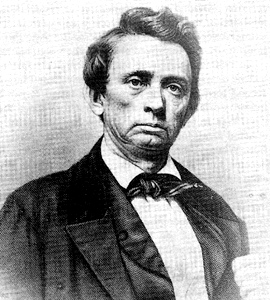
William Gannaway "Parson" Brownlow
Parson Brownlow, minister, journalist, and governor, was one of those unique individuals who influenced Tennessee culture, politics, and government during the middle half of the nineteenth century. Born in Wythe County, Virginia, orphaned at age eleven and possessing limited formal education, he joined the traveling ministry of the Methodist Church in 1826. During the next decade, he rode Methodist circuits in southern Appalachia in a crusade to save souls from the devil and other denominations. His marriage, however, forced Brownlow to abandon the church’s traveling ministry in search of work to support his family.
Parson Brownlow’s flair for writing attracted him to journalism, and in 1838 he became editor/owner of an Elizabethton newspaper popularly known as Brownlow’s Whig. The Parson dedicated the paper to promoting the Whig Party and to championing Henry Clay for president. After a year, he moved his paper to Jonesborough, publishing it there for a decade before moving the paper a second time to Knoxville in 1849. The influential Whig reached some eleven thousand subscribers across the country by the eve of the Civil War.
A thirst for controversy, which had first surfaced during his circuit-riding days, became the mainstay of Brownlow’s journalistic and political careers. His clashes with adversaries were marked by their personal and caustic nature. This truculence inspired others to crown him the “Fighting Parson.”
Brownlow captured public attention by stationing himself in the eye of many social and political controversies, and he boasted that he had never been neutral on any issue. He always defended Methodism from its detractors. With T. A. R. Nelson, Brownlow became an architect of the Whig Party in East Tennessee; he later emerged as a principal spokesperson for the “Know-Nothing” Party in Tennessee after the collapse of the Whigs. He was a major southern advocate for the Sons of Temperance and a prominent apologist for slavery. Brownlow also promoted commercial interests in East Tennessee. Most significantly, the Parson stood in the front ranks of southerners who rejected secession and the Confederacy.
Although he had battled Andrew Johnson “on every stump in Tennessee” for a quarter of a century, the Parson temporarily joined with his political enemy in resisting secession. Together they led East Tennesseans into rejecting both 1861 votes for secession by more than two-to-one margins. The first referendum failed, but the second passed four months later due to strong majority votes in Middle and West Tennessee. The anti-secession sentiment in East Tennessee became so intense, however, that Confederate authorities controlled the region only by military occupation.
After Tennessee withdrew from the Union, Brownlow continued castigating the Confederacy in the vituperative style he had mastered. Confederate authorities took no action against him at first–perhaps in the hope he would mute his attacks. This tactic failed, and after several months, they suppressed his paper. The Parson then fled to safety in the Smoky Mountains.
Brownlow wanted to relocate in Northern territory and so reached an agreement with Confederate military leaders to surrender himself, providing they would not hand him over to local civil authorities who were personal and political enemies. The agreement was violated, and the Parson was thrown into the Knoxville jail, charged with treason for his anti-secession and anti-Confederate editorials. While in jail, he observed Union sympathizers imprisoned on the slightest pretext and witnessed drumhead execution of men accused of burning railroad bridges between Bristol and Chattanooga. He became seriously ill, but three months later Richmond authorities ordered his expulsion from the Confederacy.
Upon reaching Union territory, Brownlow launched a six-month speaking tour that took him to major cities throughout the North. The tales he related of his experiences in Confederate hands made him an instant hero and celebrity. Proceeds from his speaking tour and royalties from a book relating his experience in Confederate custody generated sufficient funds to reestablish the Whig when he accompanied Union troops to Knoxville in the fall of 1863. With his paper again in print, the Parson resumed lambasting secessionists and Confederates.
Tennessee Unionists chose Brownlow to succeed Andrew Johnson as governor in March 1865, and he served two consecutive terms. Brownlow allied his administration with Reconstruction policies of congressional Republicans in opposition to those of President Andrew Johnson. By influencing the state legislature to ratify the Fourteenth Amendment in mid-1866, he swayed Congress to restore Tennessee fully to the Union. The Parson, as a result, saved Tennessee from the political reconstruction experienced by other Confederate states.
Governor Brownlow enfranchised former slaves despite his antebellum advocacy of slavery. This action provoked former Confederates to form the Ku Klux Klan for intimidating blacks and other Republican voters. The Parson undertook actions to suppress the Klan although his initiatives were somewhat ineffective.
Military operations during the war destroyed many public facilities in Tennessee, but state government was without funds for rebuilding. Brownlow led the state in backing government bonds to build railroads and other public improvements. This action indebted Tennessee for many years, but Brownlow enjoyed few other options for restoring the state’s economic health. Unfortunately, some administration officials were guilty of graft and embezzlement–none of these cases, however, involved Brownlow personally.
The Tennessee General Assembly elected Brownlow to replace D. T. Patterson, Andrew Johnson’s son-in-law, as U.S. senator, beginning in 1869. He served one term before returning home to Knoxville. In semi-retirement, the Parson resumed editorial work for his former newspaper, but the ill health he had suffered over a score of years depleted his strength. He died on April 28, 1877.
Suggested Reading
E. Merton Coulter, William G. Brownlow: Fighting Parson of the Southern Highlands (1937); James W. Patton, Unionism and Reconstruction in Tennessee, 1860-1869 (1966)



